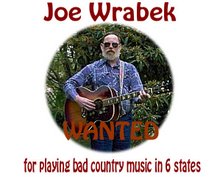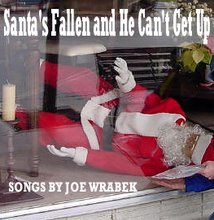So. Wants to get played on the radio, does we? And the radio station manager says she can't play anything that isn't registered with one of the performing-rights organizations, so they can pay royalties. Fair enough. This writer wants airplay, but this writer also agrees that writers ought to get paid.
This writer has a CD out, professionally recorded and mastered, and has been selling copies at gigs. This writer can do that, because all of the songs are original (lyrics and music by said writer), and said writer performed them, too. The Radio Station Thing is a new wrinkle. Sounds like writer needs... a PUBLISHER.
Publishers, however, are not easily obtainable. One doesn't just go down to the local Publisher Store and pick one off a shelf. A publisher has to be interested in representing YOU; the publisher is going to be putting out a lot of effort and money marketing your music to record companies, movie and TV producers, and "artists" looking (theoretically) for new material, and won't make any money until and unless something sells. It's very much the same dilemma a real estate agent faces–and the real estate agent isn't interested in having something in the "catalog" that's not going to sell, either.
Rather than trying to get the attention of a publisher (which a lot of other people are trying to do, too), it's always possible to become ONE'S OWN publisher. Doing that does mean you become responsible for your own marketing; then again, if no one else seems to be interested, why not? It is (theoretically) always possible to "assign" (that's what it's called) the "publishing rights" (that's what they're called) to somebody else later. In the meantime, you've got a publisher (even if it is yourself), and you can now deal with the performing rights organization–and the radio station.
So how to go about it? There are plenty of resources on line (that even agree about a lot of things). There are also people on line who are happy to sell books on the subject, and colleges that will sell you courses on it. We'll stick–right now–to the free stuff.
FIRST STEP in becoming a publisher is to register as a publisher with one of the performing rights organizations (PROs). There are 3 in the U.S.–ASCAP, BMI, and SESAC. BMI is a corporation owned by radio stations (I think) and is free. ASCAP is a membership organization and dues are (or were) ten bucks. Don't know much about SESAC, except they're the only one that sent me a letter asking me to join (that's not necessarily a good reason to do so). I'll pick ASCAP, because they reportedly monitor live performances, which is where the majority of my stuff gets played. (BMI only monitors radio stations.)
It's also necessary to join the SAME PRO as a WRITER. If this sounds redundant, remember it wouldn't be if we had a real publisher. Publishers that represent a lot of writers will want to belong to both ASCAP and BMI; we only have to worry about the one our "writer self" belongs to. Rule is that a publisher has to belong to the same PRO as the writer he or she represents. We're both going to join ASCAP–writer and publisher.
When you register with the PRO, they want you to suggest three possible names for your publishing company. They'll pick one. The reason for this is there are a lot of publishers, and you can't have a name somebody else has already claimed. Shouldn't be hard for a creative person to deal with.
SECOND STEP is making sure your paperwork is in order with local, state and Federal regulatory authorities. You need an Employer Identification Number (EIN) from the IRS; you need to file incorporation, partnership, or "doing business as" papers with the state (here in Oregon, that's the Secretary of State's Corporations Division, and we'll do the "doing business as" because we'll be a sole proprietorship); if the town requires business licenses (mine does), you need one of those, too. Note you can't apply for any of those until you have the business name–which is assigned by the PRO.
THIRD STEP. If the songs in the "catalog" aren't copyrighted yet, copyright them in the name of the publisher. If they're already copyrighted by you-the-writer, it's necessary to do an assignment of copyright to the publisher. This is the document (I think) that ensures the publisher is going to get paid. At very least, do this for the songs that are on the existing CD; you'll need to do it later for anything that's going to be on a CD.
FOURTH STEP is for the publisher to register with the Harry Fox Agency. HFA is an outfit that collects "mechanical" royalties whenever somebody cuts a record with your song on it. (I think that includes you cutting your own record, too.) HFA isn't the only outfit that does this, but they are apparently the biggest. Money is paid by a record company to HFA based on how many CDs are MANUFACTURED, not how many are sold, and HFA pays the publisher.
There. Publishing Company 101.
UPDATES:
"There's a Bone in My Soup" (what I've been calling "Blues Number Four") is up on Soundclick for listening; the artists that'll be contributing leads will pick their spots starting next Monday (5/14). I wrote the lyrics (might as well get all these blues out of my system, so I can go back to writing country music), and sang the vocal; music by Richard Bethell.
"Dead Cows and the Internet" (roughly halfway between blues and country music) is going to have to be recorded live. I want Dick Ackerman's blues harp lead on this, but he's not comfortable with a studio environment; I left him a recording of the basics, and we'll do it live when he's ready, using that 6-channel mixer (bought on eBay a couple of years ago and never used) to mix 3 mikes to 2 channels of the Tascam. Then I'll add my lead guitar afterwards.
WELCOME...
This blog is the outgrowth of a songwriting workshop I conducted at the 2006 "Moograss" Bluegrass Festival in Tillamook, Oregon. It presumes that after 30-odd years of writing and playing music, I might have something to contribute that others might take advantage of. If not, it may be at least a record of an entertaining journey, and a list of mistakes others may be able to avoid repeating.
This blog is intended to be updated weekly. In addition to discussions about WRITING, it will discuss PROMOTION--perhaps the biggest challenge for a writer today--as well as provide UPDATES on continuing PROJECTS, dates and venues for CONCERTS as they happen, how and where to get THE LATEST CD, the LINKS to sites where LATEST SONGS are posted, and a way to E-MAIL ME if you've a mind to.
Not all these features will show up right away. Like songwriting itself, this is a work in progress. What isn't here now will be here eventually. Thank you for your interest and your support.
Subscribe to:
Post Comments (Atom)



No comments:
Post a Comment